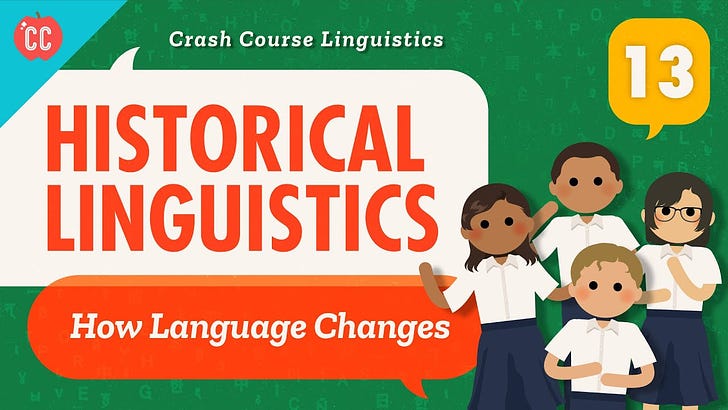Crash Course Linguistics 13 (Historical Linguistics/Language Change)
Where does language come from?
Week 13’s Crash Course Linguistics video explores language change over time, and how new languages can arise.
Topics addressed include how and why languages change, pidgins and creoles, and some methods and limitations of diachronic analysis. This week's Thought Bubble takes viewers to Nicaragua to explore the unexpected emergence of Nicaraguan Sign Language. Closed captions are available in English.
For information about how Nicaraguan Sign Language not just emerged but has itself changed over time, check out Rethinking Recapitulation: Sources of Structure in Nicaraguan Sign Language, a 20-minute recorded talk from 2015 by Dr. Ann Senghas. Most of the content is widely accessible, with more detailed discussion of syntactic changes from 6:33 to 12:55. Closed captions are available in English.
For a light, conversational introduction to historical linguistics, as well as how linguists could benefit from time travel, listen to Tracing languages back before recorded history, a 39-minute Lingthusiasm episode. This episode is available wherever you prefer to find podcasts, and a transcript is available here.
The United Kingdom Linguistics Olympiad’s practice problem about Tok Pisin offers direct engagement with one of the creoles mentioned in this week’s video. We are all European, a problem from the 2017 UKLO competition, provides practice in identifying familial relationships among modern languages based on cognates. Answers for each of these exercises are at the end of the respective linked documents.
Finally, see our past newsletter for additional video and audio resources about Proto-Indo-European and comparative reconstruction.
Coming next time, on January 8: resources about languages around the world!
Liz, Gretchen, and Lauren
About Mutual Intelligibility
Mutual Intelligibility is a project to connect linguistics instructors with online resources, especially as so much teaching is shifting quickly online due to current events. It's produced by Lauren Gawne and Gretchen McCulloch, with the support of our patrons on Lingthusiasm. Our editor is Liz McCullough.
Mutual Intelligibility posts will always remain free, but if you have a stable income and find that they’re reducing your stress and saving you time, we're able to fund these because of the Lingthusiasm Patreon and your contributions there.
For the 16 weeks of Crash Course Linguistics, Mutual Intelligibility will be sharing the video weekly, along with supporting resources. We will resume our regular link request and recommendations after the Crash Course Linguistics series. For more on how we usually operate, check out our about page.
If you have other comments, suggestions, or ideas of ways to help, please email mutual.intellig@gmail.com.



